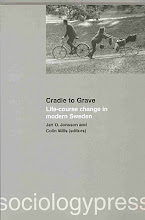In my teaching I believe in trying things out to see whether they work. For a while I've wondered whether there might be a better way to prepare MSc students for writing their dissertation than simply meeting with them on an individual basis and saying: so what do you want to write about then? A few years ago I posted my advice about writing dissertations and a few people have told me they found it helpful, but last year I also tried a new strategy.
It has seemed to me for some time that the biggest obstacle MSc students face is in choosing something worthwhile to do in the first place. In a way this isn't surprising. When you start your MSc you are a million miles from the research frontier so how can you possibly know what is worth doing? In some disciplines this problem is solved by simply giving students something to work on. I believe this can work and I have had colleagues who included it in their box of tricks. My own experience has been less happy. An essential ingredient in producing a good dissertation is a sense of ownership of the topic. If somebody just allocates you something to do then this can result in low levels of commitment and an unhealthy dependency between student and supervisor.You really don't want a student who hangs on your every word and doesn't do anything without consulting you first.
So last year I thought I'd try something different. During the first term as well as meeting my supervisees individually I also met with them for an hour a week en masse. Each was given the task of surveying the last 12 months of the top 6 generalist sociology journals in order to identify an article that a) interested them and b) we would all read and discuss. My thought was that it didn't matter what they chose, though there might be incidental benefits from our discussions, and that the real value of the exercise would be that it forced them to confront the question of the relationship between what they wanted to do/thought was interesting and what the rest of the discipline was doing/thought was interesting. To put it in a slightly pompous nutshell I wanted them to locate their own dissertation plans within an ongoing scientific research programme rather than have it appear to drop out of the sky. In my naive way I also, of course, assumed that the extra person hours put into this should help them to write better dissertations.
And so to the $64,000 question: did it work? I'm afraid I have to say that I have no convincing evidence that it did. I'm sure it was a nice experience for the students, or at least they told me so. It was certainly a nice experience for me, partly because I got to know that cohort of students much better than I normally would have. But did they write better dissertations? I doubt it. They all passed comfortably; some did a little better then others, but on the whole the quality was on average about the same as usual and the range of marks indistinguishable from the past.
Of course the numbers are small and it was probably unrealistic of me to expect to see much of a difference; but it got me thinking about the value of "experimentation" in this particular aspect of teaching. It's really difficult to learn empirically about something like dissertation supervision. The first reason is that we only ever deal with small batches at a time - the most I've ever supervised at one time is five. Secondly, there is enormous variability in the raw material itself ie the students and you would expect in those circumstances that the same "treatment" will produce very different results in different students. Thirdly, the "treatment" is highly idiosyncratic ie it is partly me (my expectations, experience, limitations, personality). What appears to work for my colleague won't necessarily produce the same results for me (because of all my quirks and peculiarities); and that means that it is very difficult to learn by pooling experience. I guess I'll just have to keep muddling through.










No comments:
Post a Comment